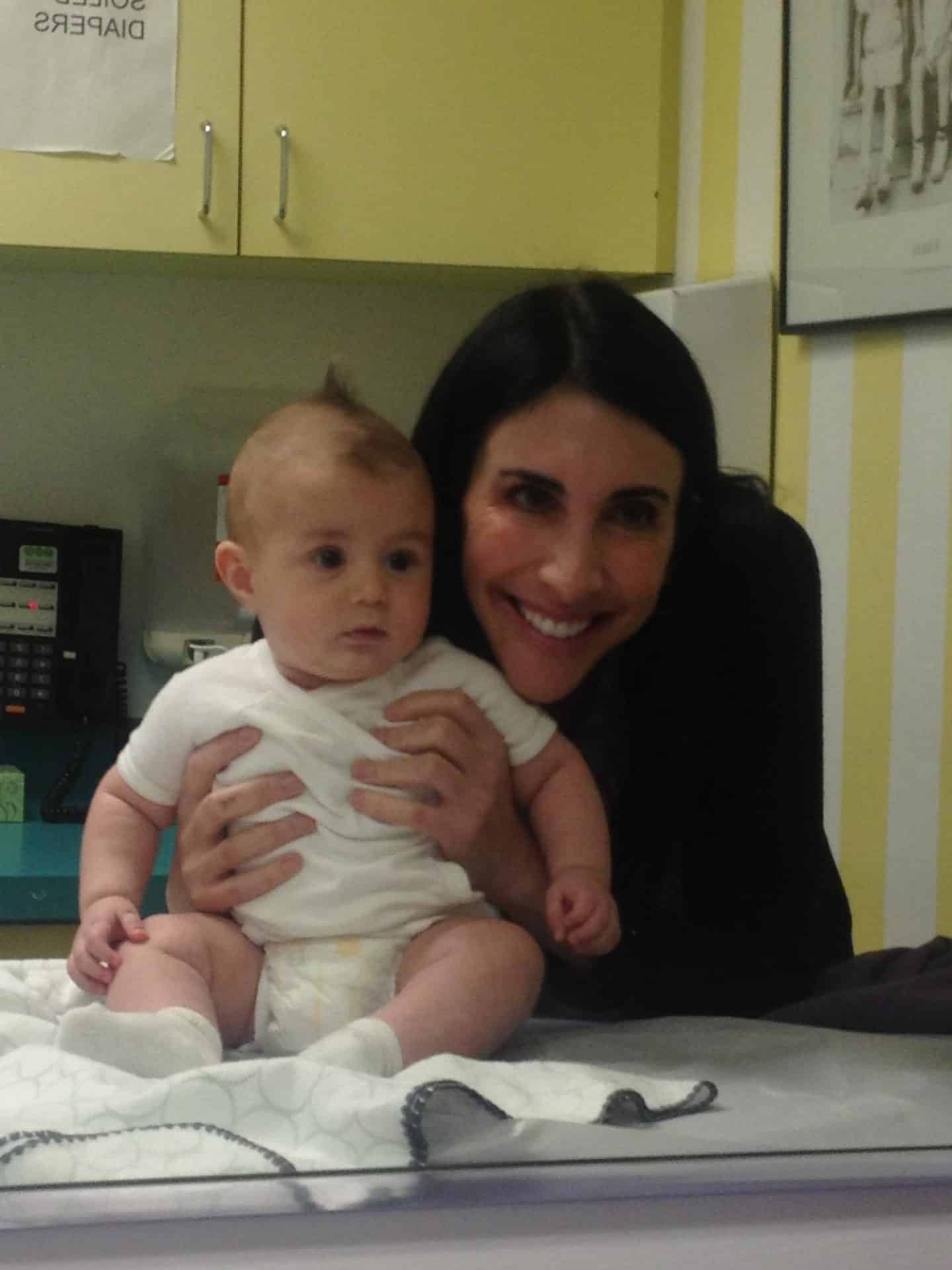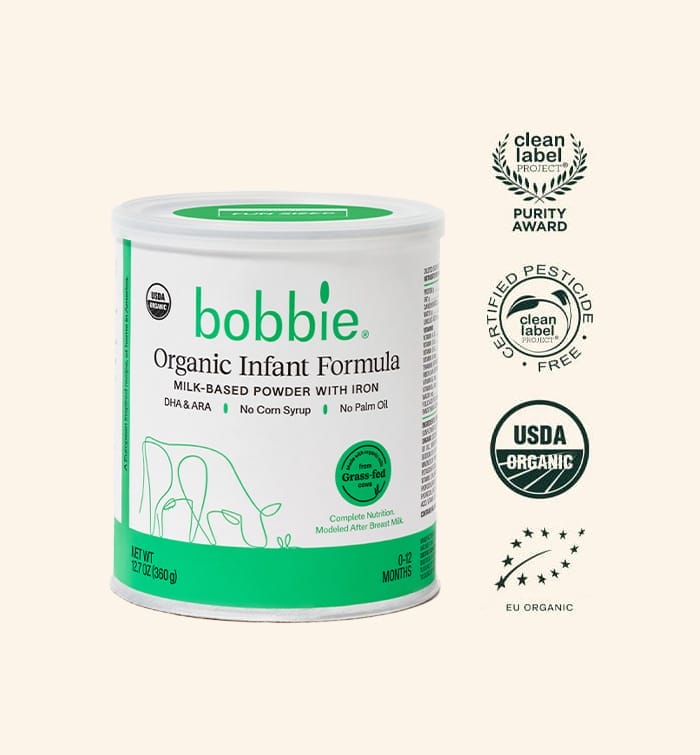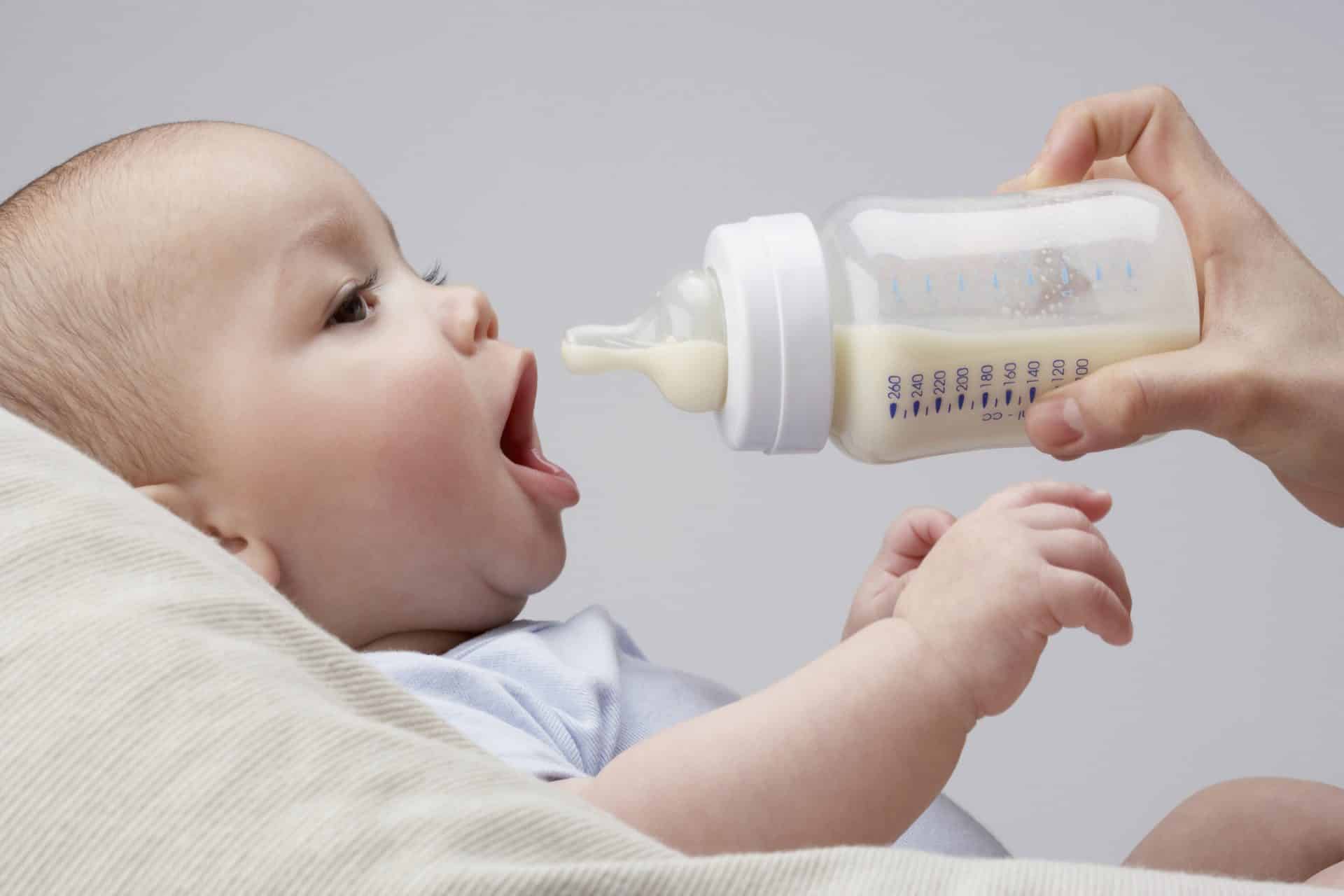We are proud to say that these posts are not sponsored. Our editorial team of Bobbie moms and writers personally select each featured product. If you buy something through our links, we may earn an affiliate commission, at no cost to you.
I’m Dr. Lauren Crosby, MD, FAAP, TV news medical expert, and parent. As a board-certified practicing pediatrician with over 20 years experience, I have worked with thousands of families, helping to navigate everything from the birth of their baby to their child going off to college. I also have two sons and have gone through the same experiences that all parents go through. Whether it is having a baby with colic, a broken arm, ear infections, allergies or feeding problems, I have been there too (see below!). On a day to day basis, I see children for check-ups, vaccinations, urgent visits, and sick visits providing advice, care and treatment. I also work to distill the news and social media trends into practical advice tailored to each child and their family. I tend to be the go-to when a family debate occurs on the topic of care for the child, or when an in-law disapproves of something.



Pediatricians are the experts in infant care, growth and development. Providing advice on feeding a baby is a huge part of what we do. Others may provide advice that is priceless, but the overall health of the child rests in our hands and in the parents’ hands. When it comes to feeding a baby, there is so much information on the topic that it can be extremely overwhelming for a parent. They hear advice from a nurse, a best friend, a cousin, a grandparent and others, even strangers. I tell parents to pick their person to listen to, their “guru” so to speak, to help them turn off some of the noise.
The topic of combination feeding is just one of many feeding topics that can get complex and confusing. The bottom line is that a baby needs to be fed. With the help of their pediatrician, a parent will figure out over time what works best for their baby and for their family.
- What’s the difference between supplementing and combination feeding?
- When do you insist baby formula be introduced?
- When do you suggest mom introduce formula?
- Frequently asked medical questions regarding supplementing with formula
- Is infant formula safe?
- Is formula unhealthy for a newborn?
- When should I supplement with baby formula?
- Is it ok if I alternate breastfeeding and baby formula?
- Should I give baby formula at night and save breast milk for daytime?
- Will formula feeding help prolong my breast milk supply?
What’s the difference between supplementing and combination feeding?
Though many use these terms interchangeably which is completely fine, they represent different things to different people. The parent knows what they mean and that’s all that matters.
Supplementing is a type of combo feeding where breast milk is the main source of nutrition. With typical combo feeding, both breastmilk and formula share as the main sources of nutrition.
Many moms might start out just supplementing with a little formula here and there and over time become combo feeders because their supply either never catches up OR they find it works better for them, due to work-life balance or family-life balance.
It is more about intent than what you’re doing — use which term depending on what your main plan is. If the intent is to breastfeed but there is, for example, not enough milk yet so the baby needs some formula — that is typically supplementing.
With any form of combo feeding, a parent may simply want to do both breastfeed and give formula or might have to out of necessity.
When would you supplement breast milk with formula?
A mom might start out supplementing with some formula then doesn’t have enough milk or cannot pump so she continues giving formula for some of the feeds. I have had some moms who have had a bad experience breastfeeding so the minute the next child is born they tell me, “I am combo feeding from the start.” I explain that that is totally fine, BUT if they want the baby to get some breast milk then we first need to at least try to establish her supply. That does not mean they can’t supplement with some formula while establishing supply but the more they nurse those first few weeks, the more likely it is they will have some breast milk for the baby. If that is too stressful, we make a plan regarding when to give the formula, how much, how often.
Sometimes, parents choose to do formula feedings at night so they can both get some sleep and so mom is not anxious and stressed about the baby getting enough food. Or, parents can top off the baby after a breastfeed if it still seems very hungry. There are many ways to combo feed depending on each family’s unique situation.
Despite all of the ways we can quantify and reassure a worried/anxious/stressed parent that the baby is doing ok (weight loss is within normal limits, urinating and pooping enough and the baby does not have significant jaundice), some moms are traumatized from a prior experience so they need the piece of mind that giving formula gives them.
When do you insist baby formula be introduced?
I insist on formula when it is a medical issue for the baby: the baby has lost more than 10% of its birth weight (especially if mom’s milk has not come in yet), is not gaining enough weight or is continuing to lose weight, is dehydrated, has low blood sugar, and sometimes when the baby has significant jaundice requiring phototherapy.

Shop Bobbie Organic Infant Formula
Bobbie Organic Infant Formula is a USDA Organic, EU-style infant formula that meets all FDA requirements. It is a complete nutrition milk-based powder modeled after breast milk and is easy on tummies. It is non-GMO and doesn't have corn syrup, palm oil, or maltodextrin. Learn more about Bobbie.
When do you suggest mom introduce formula?
I hint at it when I feel the mom’s mental health is suffering. Breastfeeding takes a lot of time, especially at the beginning. I have seen mom’s meltdown because of exhaustion, so I might suggest a formula feed at night given by someone else so she can get some rest.
Why do new parents feel guilty about supplementing with formula?
First time parents have a harder time with the idea of giving some formula, even if it is necessary, because they have no past experience or anything to compare it with. They have expectations that have to be carefully managed if the initial intent was to breastfeed only.
Many new parents are aware of the benefits of breastfeeding, but they have no idea how difficult it can be for the new mother. They want the best for their baby, and they hear the saying “breast is best” so they feel bad if they cannot do it completely. They feel they are not good parents. Some feel like failures.
Some parents are fine giving some formula because they just want what is best for the baby and will do whatever it takes to make sure the baby is healthy and safe.
You should trust your pediatrician to work with you, guide you and listen to you. If you do not trust their advice, then maybe they are not a good fit.
How do you reassure parents that combo feeding can be a positive part of the feeding journey?
When a parent has never had a newborn before or never had a baby who was difficult to breastfeed or had health issues, it just takes time to carefully explain the risks that may be involved if the baby is not doing well. Lots of reassurance needs to be provided. And lots of listening and empathy needs to take place.
Having an experienced lactation consultant working with them in addition to the pediatrician is always helpful. The skills and support they provide will validate the situation and often they have other ideas that the parents might like to try. We just need to have an open dialogue about it so we are all on the same page with a follow-up plan.
Do pediatricians supplement with baby formula for their own children?
Yes! In fact, I had my first son during my pediatric residency. I had to return to the training program when he was 7 weeks old. I tried hard to breastfeed exclusively (I am a pediatrician after all!) but my baby had significant jaundice, was getting dehydrated waiting for my milk to come in and my nipples got mangled during the first week (sore, scabs, bleeding). It was really rough.
I had help from a lactation consultant. We both knew he needed some formula, and I needed my nipples to heal. I gave formula and pumped breastmilk to him with a syringe (to try to prevent introducing another nipple that might make it harder than it already was for him to latch on to me), and also tried pumping instead of nursing for some feeds, and that actually hurt less. I eventually did give some breast milk in bottles as did my husband because the number one goal was to make sure my baby was healthy. I went back to breastfeeding when his jaundice was better but it always was very painful no matter what I tried. Knowing I was going back to work so soon after his birth, I just decided to pump instead and give all bottles of breastmilk. I was fortunate to have a good supply so I was able to stock up. By the time he was 4 months old, I couldn’t keep up with his demand so I introduced formula. After another month, it was just too hard to pump at work (running to newborn deliveries, working in the NICU, etc) so I slowly stopped pumping and put him on formula. And he did great!
Frequently asked medical questions regarding supplementing with formula:
Is infant formula safe?
Yes. The contents and safe production of all infant formulas in the United States must meet the standards of the FDA.
Homemade infant formula however is not safe. Besides the fact that it is not regulated to ensure quality, these often are missing vital components necessary for the baby’s nutrition. They may have dangerously high or low levels of salt or other nutrients.
Is it ok to give my baby infant formula?
Yes. It is absolutely ok as it is an established form of safe nutrition for the baby. It is a healthy alternative to breastfeeding.
Is formula unhealthy for a newborn?
No, formula is not unhealthy for a newborn. It is made for them. Formulas that are regulated by the FDA are perfectly safe providing the nutrition a baby needs to grow and thrive.
My doula said formula is not safe, is that true?
Formula IS ok.
A doula is a professional who is trained at providing educational, emotional and physical support to a pregnant, laboring or new mother. Many doulas are proponents of natural childbirth. Some doulas prefer exclusive breastfeeding. The doula wants to determine if formula is necessary because part of their job is to help the body deal with what it is going through and helping the mother with lactation is part of that.
When should I supplement with baby formula?
It is best to discuss this with your pediatrician but cases where it is necessary to supplement with formula tends to be if the baby’s health is at risk: too much weight loss, dehydration, not gaining weight when the baby should be, significant jaundice, exhausted parent who needs a few hours sleep.
Is it ok if I alternate breastfeeding and baby formula?
This can be perfectly fine to do. I think of that as true combo feeding.
This is not recommended, however, until we know that there is enough breastmilk to satisfy a baby for a full feed and to make sure the supply is established. If you go too long without breastfeeding or pumping, the milk supply might start to decrease.
Another issue tends to be if the baby will switch nipples back and forth. Some babies prefer only the breast and some prefer only the bottle. Others are flexible.
Should I give baby formula at night and save breast milk for daytime?
Many parents find the baby sleeps longer when they have formula at night. It digests more slowly than breastmilk so they may feel full longer.
The thing to note is that if the baby is getting formula all night, the mom will still need to get up and pump at least once to keep her supply up.
Will formula feeding help prolong my breast milk supply?
Not exactly. It can keep you from using up your breast milk supply as quickly as you would have without another feeding option.
It depends on how many formula feeds are given. If one or two bottles of formula are given per week, that is unlikely to have a significant effect in breastmilk supply. If you give formula a couple bottles a day and don’t pump, then your body will know the demand is less and adjust by making less breast milk.
The more formula given instead of breastfeeding, the less breast milk you make unless you also spend the time to pump multiple times per day to keep up the breastmilk supply.
Will my baby be less smart if they are formula fed?
Though there is some research that suggests that breastfeeding gives children a cognitive advantage in life, other research shows that the advantage is not either significant or actually from being breastfed. The reason for this discrepancy is more likely because cognition is multifactorial. Breastfed children might grow up in an environment that tends to support cognitive development. There are so many other factors that contribute to a positive cognitive outcome: good prenatal care, a mother who does not smoke, drink alcohol or do drugs, parenting well like talking to the baby all the time and reading to them, listening to music, letting the child explore, setting limits on screen time, and there are other factors like genetics, parental IQ, education level and incomes.
I had to supplement with formula for both of my sons when they were infants, then combo feed them, and then eventually put them both on formula. And they did fine! Both of them are college graduates from UC Berkeley and grad school followed.

Shop Bobbie Organic Infant Formula
Bobbie Organic Infant Formula is a USDA Organic, EU-style infant formula that meets all FDA requirements. It is a complete nutrition milk-based powder modeled after breast milk and is easy on tummies. It is non-GMO and doesn't have corn syrup, palm oil, or maltodextrin. Learn more about Bobbie.

